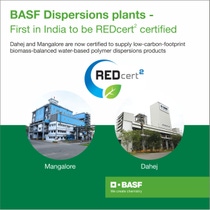Media
BASF’s dispersions plants in Dahej and Mangalore now certified to supply certified low-carbon-footprint, biomass-balanced water-based polymer dispersions
- First plants in India capable of producing REDcert2-certified biomass-balanced acrylic dispersions
- REDcert2 standard complies with the EU Directive on Renewable Energy and ensures correct attribution of renewable resources to the final products
- Initiative supports BASF customers in India looking to commit to a low-carbon-footprint roadmap
India – February 8, 2024 – BASF India Limited is pleased to announce that its two dispersions plants in Dahej and Mangalore, India, have each received REDcert2 certification. These plants are the first in India to achieve the REDcert2 standard, an independent third-party audit process, marking a significant milestone in BASF’s commitment to sustainability and environmental stewardship. This certification enables BASF to supply certified low-carbon-footprint dispersions through the biomass balance (BMB) approach that perform identically to fossil-based dispersions.
Andreas Fechtenkoetter, Senior Vice President, Dispersions Asia Pacific, BASF said, “Achieving REDcert2 certifications for our dispersion plants in India underscores our commitment to driving sustainability and innovation as an industry leader. We have successful customer cases for our REDcert2-certified products in the Asia Pacific region. Customers in countries such as China, Japan, and other ASEAN markets have embraced our biomass balanced solution to reduce their carbon footprint along the value chain. Paint manufacturers and consumer goods producers have adopted our biomass balanced product portfolios and are leveraging its benefits to achieve their sustainability objectives.”
With India’s continued prioritization of CO2 reduction, BASF is seeing a growing demand for sustainable products in the country. The Indian government has committed to achieve net zero emissions by 2070. “With our REDcert2-certified dispersions plants in operation, we are well-positioned to supply biomass-balanced dispersions to our customers in the country and support their sustainability plans,” said Milind Joshi, Business Director, Dispersions (South Asia), BASF. “By adopting our low-carbon-footprint solutions, customers are not only differentiating themselves from competitors but also contributing to the larger goal of combating climate change.”
The two certified dispersion plants in India bring the number of BASF dispersion plants in the Asia Pacific region that have received REDcert2 certification to five. This accomplishment has further strengthened BASF’s ability to meet the growing demand for low-carbon-footprint solutions across various industries.
In BASF’s biomass balance approach, renewable raw materials are used as feedstock in the very first steps of chemical production. The proportion of renewable raw materials utilized is then allocated to specific sales products using a mass balance method certified by REDcert². The REDcert² certification system confirms that for the biomass balanced product, BASF has replaced relevant quantities of fossil-based resources with renewable feedstock. For more information about our biomass balance approach and the REDcert2 standard, please visit the following links:
BASF’s biomass balance approach: https://www.basf.com/hk/en/products/dispersions-resins/sustainability_in_a-eda/biomass_balance_approach.html
BASF’s Dispersions & Resins division
The Dispersions & Resins division of BASF develops, produces and markets a range of high-quality polymer dispersions, resins, additives and electronic materials worldwide. These raw materials are used in formulations for a number of industries, including coatings, construction, adhesives, printing and packaging, electronics and paper. With its comprehensive product portfolio and its extensive knowledge of the industry, the Dispersions & Resins division offers its customers innovative and sustainable solutions and helps them advance their formulations. For further information about the Dispersions & Resins division, please visit www.dispersions-resins.basf.com.
About BASF
At BASF, we create chemistry for a sustainable future. We combine economic success with environmental protection and social responsibility. More than 111,000 employees in the BASF Group contribute to the success of our customers in nearly all sectors and almost every country in the world. Our portfolio comprises six segments: Chemicals, Materials, Industrial Solutions, Surface Technologies, Nutrition & Care and Agricultural Solutions. BASF generated sales of €87.3 billion in 2022. BASF shares are traded on the stock exchange in Frankfurt (BAS) and as American Depositary Receipts (BASFY) in the United States. Further information at www.basf.com.
About BASF in India
BASF has successfully partnered India’s progress for more than 130 years. As of the end of 2022, BASF had 2,342 employees in India with 8 production sites and 42 offices throughout the country. The Innovation Campus Mumbai and the Coatings Technical Center in Mangalore are both part of BASF’s global technology platform. In 2022, BASF registered sales of approximately €2.7 billion to customers in India. Further information is available on www.basf.com/in.

